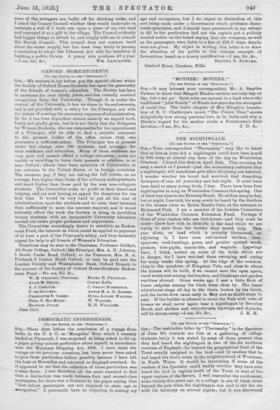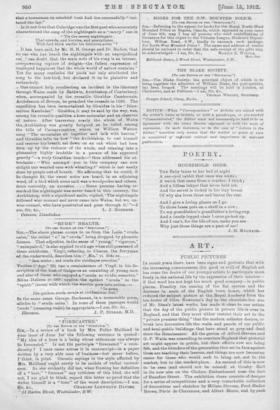[To TRU EDITOR OF Ilia " STRCTATOR."] Sin,—The instructive letter
by " Thormanby " in the Spectator of June 8th reminds me that at a gathering of college students lately it was stated by some of those present that they had heard the nightingale in two of the six northern counties of England—far beyond the geographical limit of the Trent usually assigned to the bird—and by another that he bad heard the bird's notes in the neighbourhood of Wrexham, in North Wales. It would be interesting if some of the. readers of the Spectator could testify whether they have ever heard the bird in regions north of the Trent or west of the upper regions of the Severn. I well remember the excitement,. some twenty-five years ago, in a college in one of these areas beyond the pale when the nightingale was said to stir the air. with his harmony on several nights; but it was discovered
that a townaman on mischief bent had too suocessfully " imi. sated the lay."
' Is it not true that Coleridge was the first poet who accurately characterized the song of the nightingale as a." meiry " one in "'Tie the merry nightingale That crowds,.and hurries, and precipitates With fast thick warble his delicious notes "P
It has been said, by Mr. H. B. George and Dr. Hadow, that no .one who has heard the nightingale with an unprejudiced ear " can doubt that the main note of his song is an intense, overpowering rapture of delight—the fullest expression of unalloyed happiness that the whole world of nature contains." Yet for many centuries the poets not only attributed the song to the hen-bird, but declared it to be plaintive and melancholy.
One cannot help recollecting an incident in the itinerary through Wales made by Baldwin, Archbishop of Canterbury, when, accompanied by the versatile Giraldus Cambrensis, Archdeacon of Brecon, be preached the crusade in 1188. The .expedition has been immortalized. by Giraldus in his " Rine- ;atrium Kambriae." Giraldus, it may be said by the way, was, among his versatile qualities, a keen naturalist and anobserver of nature. After traversing, nearly the whole of Wales thn.Archbiehop was greatly fatigued as he toiled among the hills of Carnarvonshire, where, as William Watson sang " The mountains sit together and talk with heaven," and Giraldus tells -us how " the Archbishop, to rest himself and recover histbreath, sat down on an oak which had been Cern up. by the violence of the winds, and relaxing into a pleasantry highly laudable in a person of his approved gravity "—a truly Giraldian touch—" thus addressed his at- tendants : Who amongst you in this company can now delight our wearied ears with•whistling ?' which is not easily done by people out of breath. He affirming that he could, if he thought fit, the sweet notes are heard, in an adjoining wood, of a bird which some said was a woodpecker and others, More 'correctly, an aureolus. . . . Some persons having re- Marked the nightingale was never beard in this country, the Archbishop, with a significant smile, replied, The nightingale :Followed wise counsel and never came into Wales, but we, un- wise counsel, who have penetrated and gone through it.' "—I











































 Previous page
Previous page